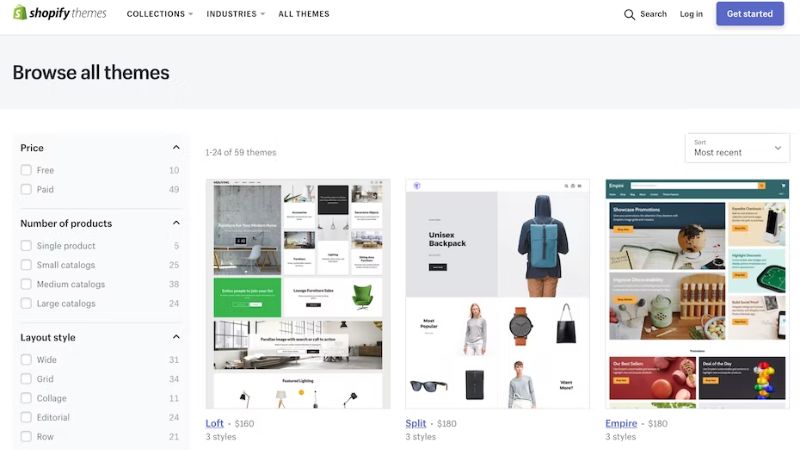Best Shopify Competitors & Alternatives

Shopify is a widely popular e-commerce platform that has helped thousands of businesses around the world sell their products online. With its user-friendly interface, extensive range of features, and flexible payment options, it’s no wonder that Shopify has become a go-to choice for many entrepreneurs. However, it’s important to keep in mind that Shopify is not the only game in town. There are several other e-commerce platforms that offer similar features and capabilities, and it’s worth considering them as well when deciding which platform is best for your business. In this post, we’ll take a closer look at some of the main Shopify competitors and compare their pros and cons to help you make an informed decision.
Overview of major Shopify competitors
WooCommerce: WooCommerce is a popular open-source plugin for WordPress that allows users to turn their WordPress site into an online store. It has a large user base and a wide range of features, including support for multiple languages and currencies, various payment gateways, and the ability to customize the look and feel of the store.
Magento: Magento is a flexible, feature-rich e-commerce platform that is popular among larger businesses. It offers a wide range of features, including support for multiple stores and languages, customizable product pages, and advanced marketing and reporting tools. However, it can be more complex to use and requires a higher level of technical expertise to set up and manage compared to some other platforms.
Other notable competitors: Some other notable competitors to Shopify include 3dcart, Volusion, and Wix eCommerce. Each of these platforms has its own unique set of features and target market, and it’s worth considering them when deciding which platform is right for your business.

Comparison of Shopify to its competitors
Here is a comparison of Shopify to its major competitors in terms of pricing, ease of use, range of features and integrations, and target market:
Pricing
Shopify: Shopify offers a range of pricing plans, starting at $29 per month for its Basic plan and going up to $299 per month for its Advanced plan. It also charges transaction fees on some of its plans, although these can be waived if you use a specific payment gateway.
WooCommerce: WooCommerce is a free plugin, but you will need to pay for hosting and a domain name for your store. Prices for hosting and domains vary depending on the provider you choose.
Magento: Magento offers both a free Community edition and a paid Enterprise edition. The Enterprise edition offers more advanced features and support, but it also comes with a higher price tag.
Ease of use
Shopify: Shopify is generally considere to be one of the easiest e-commerce platforms to use, with a user-friendly interface and a wide range of tools and resources to help you get start.
WooCommerce: WooCommerce can be more complex to set up and manage compared to some other platforms, particularly if you are not familiar with WordPress. However, it also offers a wide range of resources and support to help users get start.
Magento: Magento can be more complex to use compared to some other platforms, and it requires a higher level of technical expertise to set up and manage.
See Also: Best Chainsaw Chap
Range of features and integrations
Shopify: Shopify offers a wide range of features and integrations, including support for multiple sales channels, customizable product pages, and a variety of payment gateways. It also has a large app store with hundreds of integrations to choose from.
WooCommerce: WooCommerce offers a wide range of features and integrations, including support for multiple languages and currencies, customizable product pages, and various payment gateways. It also has a large plugin library with hundreds of integrations to choose from.
Magento: Magento offers a wide range of advanced features and integrations, including support for multiple stores and languages, customizable product pages, and advanced marketing and reporting tools.
Target market
Shopify: Shopify is designed for businesses of all sizes and industries, and it offers a range of pricing plans to suit different budgets.
WooCommerce: WooCommerce is primarily targeted at small and medium-sized businesses, although it can be use by larger businesses as well.
Magento: Magento is primarily targeted at larger businesses and enterprise-level organizations, although it can also be use by smaller businesses.
Pros and cons of using Shopify versus its competitors
Pros of using Shopify
User-friendly interface: Shopify is generally considered to be one of the easiest e-commerce platforms to use, with a user-friendly interface and a wide range of tools and resources to help you get started.
Wide range of features: Shopify offers a wide range of features, including support for multiple sales channels, customizable product pages, and a variety of payment gateways. It also has a large app store with hundreds of integrations to choose from.
Flexible payment options: Shopify supports a wide range of payment gateways and allows you to accept a variety of payment methods, including credit cards, PayPal, and more.
Good customer support: Shopify has a reputation for providing good customer support, with a variety of resources and tools available to help users get the most out of the platform.
Cons of using Shopify
Transaction fees: Shopify charges transaction fees on some of its pricing plans, although these can be waive if you use a specific payment gateway.
Limited control over certain aspects of the platform: Some users may feel that they have limited control over certain aspects of their store, such as the checkout process, as Shopify does not allow users to customize these areas as much as some other platforms.
Limited design customization: While Shopify does allow users to customize the design of their store to some extent, it does not offer as much flexibility in this area as some other platforms.
Choosing the right Ecommerce platform
When choosing an e-commerce platform for your business, there are several factors that you should consider:
Cost: One of the main considerations when choosing an e-commerce platform is cost. Make sure to compare the pricing plans of different platforms and consider what features are include at each price point. Don’t forget to factor in any additional costs, such as transaction fees or costs for add-on features or integrations.
Scalability: Think about the long-term growth potential of your business and choose a platform that is scalable and can grow with your business. Consider whether the platform allows you to easily add new products, handle larger volumes of traffic and orders, and integrate with other tools and systems as your business grows.
Integration with other tools: Consider whether the e-commerce platform integrates with the other tools and systems that you use in your business, such as your accounting software or customer relationship management (CRM) system. This can save you time and effort in managing your business and ensure that your data is consistent across all of your systems.
How to choose?
Customer support: Choose a platform that offers good customer support and resources to help you get the most out of the platform. Consider whether the platform offers live support, documentation and guides, and community forums where you can get help and advice.
Ease of use: While it’s important to choose a platform that has the features and capabilities that you need, it’s also important to consider the ease of use of the platform. Choose a platform that is intuitive and easy to navigate, particularly if you don’t have a lot of technical expertise.
Customization: Consider whether the platform allows you to customize the look and feel of your store to match your brand and style. Some platforms offer more customization options than others, so choose a platform that meets your needs in this area.
Target market and industry suitability: Consider the target market and industry that the platform is design for, and choose a platform that is a good fit for your business. Some platforms may be better suite to certain types of products or industries, so make sure to consider this when making your decision.
Conclusion
Shopify is a widely popular e-commerce platform that offers a range of features and capabilities to help businesses sell their products online. However, it’s important to keep in mind that Shopify is not the only option available, and there are several other e-commerce platforms that offer similar features and capabilities. When choosing an e-commerce platform for your business, it’s important to carefully consider your options and choose a platform that meets your specific needs and budget. Make sure to consider factors such as cost, scalability, integration with other tools, customer support, ease of use, customization options, and target market and industry suitability. By taking the time to carefully compare your options, you can choose the platform that is best suite to help your business success.









